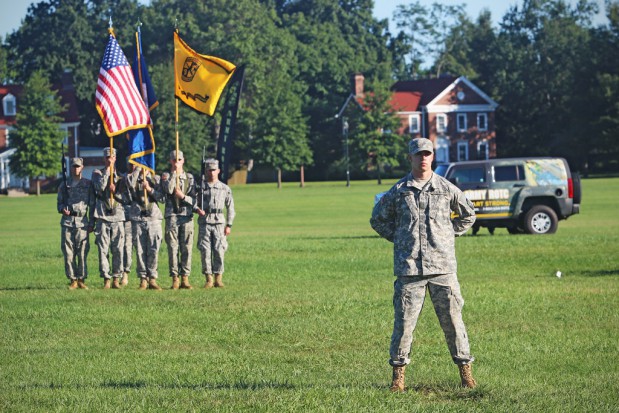
When the 8 a.m. weekday alarm goes off, many students contemplate whether or not they should attend their 8:30 a.m. classes. Meanwhile, there are 60 students who have already attended their first class, worked out, ate breakfast and are on their way to their second class of the day.
This group of 60 is known as the Furman Army Reserve Officers’ Training Corps (ROTC) Cadets.
ROTC is not merely a club with morning commitments and camouflage uniforms. The Furman ROTC program is an affiliate of the U.S. Army comprised of students from both Furman University and North Greenville University. Cadets in the program are everyday college students who attend the same classes as the average student. Their major is not always military science either. They graduate from their respective universities with a major in their desired fields of study.
The ROTC program is designed to be different from traditional military programs such as West Point or the Citadel. in that it wants cadets to have a “normal college experience.” Cadets are sorority sisters, fraternity brothers, band members, actors and even varsity athletes. The only difference is ROTC Cadets are learning a myriad of life long lessons in addition to their academic responsibilities and often receive full-tuition scholarships for their commitment.
The general goal of the ROTC program is to develop competent, confident and intelligent cadets so they can one day be commissioned as an officer in the U.S. Army. The program does this by providing hands-on training during the school year in addition to a typical college course load. Cadets attend physical training three times a week, two 50-minute classroom sessions and a two-hour outdoor lab session. In each training event, cadets are challenged mentally and physically with the purpose of developing themselves as leaders. Classes and labs focus on developing critical thinking skills, ethical values and leadership confidence. Cadets earn two course credits per semester for their participation.
Cadets are rewarded for their commitment to the program through the payment of roughly $250,000 over the course of four years at Furman. Most Furman ROTC Cadets are on a full scholarship that covers their entire tuition, room and board, books and even pays them a bi-weekly stipend of hundreds of dollars to cover costs of living. They are graduating debt free with a nice chunk of change in their pockets.
With the acceptance of a scholarship, however, comes the price of obligatory service time in the U.S. Army. When cadets accept a scholarship from the ROTC program, they are obligated to serve eight years in the Army Reserve or National Guard, known as the Reserves, at a minimum.
The Reserves is part-time job with the Army in which soldiers attend one weekend of training a month and an additional annual training of two weeks. The Reserves is meant to offer soldiers the opportunity to have a full-time civilian career in whatever job they choose. The Army has absolutely zero say in their civilian careers.
If cadets want to be a full-time soldier when they graduate, the ROTC program can also make that happen. Qualifying cadets can be selected to serve their obligated time in the Regular Army under Active Duty status. Active Duty is a soldier’s full-time job upon graduation. Compensation for Active Duty ROTC program graduates is an estimated $55,000, taking into account base pay and the fact that health insurance, housing and some meals are all paid for by the Army. Depending on an officer’s specific job in the Army, it can be well over the estimated $55,000. Nonetheless, one of the best perks of being an Army ROTC Cadet at Furman is knowing you have a guaranteed, well-paying job after graduation.
Additionally, the ROTC program allows its cadets to delay their obligated service time by allowing them to attend additional schooling. Cadets can even get additional scholarships to cover the additional tuition. Upon graduation from the secondary school, cadets may begin their service time as either attorneys or doctors in either the Army or the Reserves.
Perhaps the most exciting perk of being an ROTC Cadet at Furman lies in its fully funded summer opportunities. This past summer, cadets had the opportunity to travel the world to countries such as Tanzania, Rwanda, Cambodia and The Republic of Georgia. In previous summers, cadets traveled to Thailand, Bulgaria, Guyana and Spain. The U.S. Army paid for them to spend a month in a foreign country conducting various non-combative missions in order to aid the Army’s goal of producing culturally aware leaders. Other summer opportunities included attendance to the historic Airborne School, Air Assault School, Rocky Mountain High, Cadet Leadership Course and Cadet Initial Entry Training. Airborne School certifies soldiers to conduct combat jumps out of aircrafts, and Air Assault certifies soldiers in conducting helicopter rappelling operations out of the UH-60 Blackhawk. Every summer opportunity is of absolutely zero expense to the cadet. In fact, cadets actually get paid to attend training. The ROTC program even has an extensive network of civilian internships that becomes available to cadets in the program.
Yes, there are, in fact, some tough times in the life of a Furman cadet, such as the 5:30 a.m wake-up times. But in the grand scheme of things, every cadet in the program is proud of what they do and even more proud of what they are committed to do for this nation.
Being a part of a cohesive unit dedicated to the same goals drives the success of the program and defines the essence of Army ROTC. Furman’s historic Army ROTC program now rests in the hands of its current cadets who are earning their place in the world’s best military.
Thanks in part to the Furman Army ROTC program, the U.S. Army’s next generation of leaders will be ready for whatever challenge lies ahead.